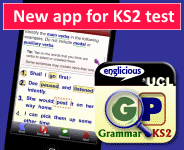Antonymy 2
Objective
To examine how adjective antonyms are formed and used.
Activity 1
Adjectives commonly have opposite words, or antonyms. When we think of an adjective, we often immediately think of its opposite. For example:
- rich - poor
- old - young
- easy - difficult
For each of these five sentences, write down the pair of adjective antoynms that could fill the gap.
- Brian lifted his backpack. It was light/heavy
- The train journey had been very long/short
- His grandfather left him a large/small sum of money.
- The slice of bread was too thick/thin
- The towels in the bathroom were wet/dry
Activity 2
Just like with nouns, adjective antonyms can be formed by using prefixes.
For example, we can write this sentence in two ways:
- He lost the game and felt very sad.
- He lost the game and felt very unhappy.
In the second example, we took the antonym of 'sad' and added the un- prefix.
Read these four sentences. Identify the adjective and replace it with an antonym and a negative prefix to keep the same meaning.
If you need a hint, click the 'Adjectives' button to see a list of possible antonyms.
- That was a very mean remark
- The children can be very naughty in this class
- I thought her speech was boring.
- The substitute teacher is a little naive.
kind, obedient, inspiring, experienced
Here are the sentences with some antonyms with prefixes you could use:
- That was a very unkind remark
- The children can be very disobedient in this class
- I thought her speech was uninspiring.
- The substitute teacher is a little inexperienced.
Activity 3
English uses several different prefixes to form antonyms. Here are some clues that help you know which one to use:
- Un- is used with words of Anglo-Saxon origin, which tend to be shorter, everyday words.
- There are many different prefixes for Latin origin words, which tend to be longer and more specialised.
- Dis- and in- come before vowels, and il-, im- and ir- come before consonants.
Keep these hints in mind in the next activity.
Add the correct prefix to the 12 adjectives. Next, write a sentence using each word.
- visible
- similar
- equal
- legible
- content
- loyal
- animate
- interesting
- aware
- courteous
- partial
- fair
Welcome!

Englicious is totally free for everyone to use!
But in exchange, we ask that you register for an account on our site.
If you’ve already registered, you can log in straight away.
Since this is your first visit today, you can see this page by clicking the button below.
- Printer-friendly version
- Log in to view or leave comments

